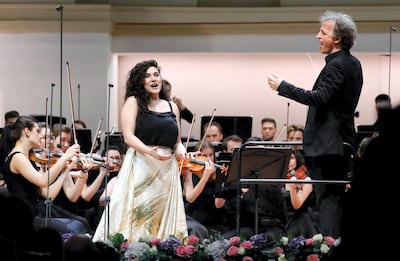Thanks to Covid-19, we have been getting most of our dose of culture online, as we take in everything from virtual art exhibitions to live-streamed concerts.
The compositions of Mozart, Bach and Brahms exist in the public domain, which means their use is unrestricted
Classical musicians have also been riding the virtual wave, performing live performances on social media, but something has been dimming their spotlight: copyright bots.
Classical musicians and organisations have been experiencing disruptions and even shutdowns during their live-streamed performances on Facebook and YouTube, as bots or content identification software flag their music as copyrighted material, a report from The Washington Post reveals.
How do they detect copyrighted material?
Powered by algorithms, the automated bots scour the internet for unauthorised or illegal use of copyrighted video and audio clips. They do this by analysing the content and comparing them to reference audio files sent by record companies and performing rights societies. Online content deemed in breach of copyright laws is then taken down or muted; you may have seen this in YouTube clips that won’t play due to a copyright claim by a company or when Instagram videos featuring pop songs suddenly disappear.
But classical music has proven to be a tricky area. The compositions of Mozart, Bach and Brahms, for example, exist in the public domain, which means their use is unrestricted.
However, if a musician releases an album with his or her own renditions of Beethoven, for example, with the record label Naxos, the audio would then be available for bots to use as reference to take down similar-sounding clips.
The automated bots simply do not have the ‘trained ears’ to differentiate between separate recordings of classical pieces.
When classical musicians play these works, they add their own flourishes or nuances to the piece, and certain sections may match copyrighted clips of recordings by other musicians or renditions of the piece, even though neither have ownership to the centuries-old original material, written by composers and musicians who are long gone.
But here's how they sometimes they get it wrong
In the case provided by The Washington Post, a man named Adrian Spence, the artistic director of chamber music ensemble Camerata Pacifica, broadcasted a previous performance of Mozart's Trio in E flat (K. 498), which was flagged by bots for containing a clip with "audio owned by Naxos of America".
Facebook suspended Camerata Pacifica’s access to live-streaming, while Spence disputed and cleared the claim.
In another instance, YouTube also blocked a live stream of a recorded performance of Carl Nielsen's Wind Quintet, Op. 43 by the ensemble, citing five copyright claims from different record companies.
“I have no protection for my own produced material,” Spence told the American publication. “If you want to put a copyright claim against me, I’m happy to take the time to write back to you and say, ‘This is an erroneous claim and here’s why.’ But when you’re immediately blocking videos or streams, that’s negatively impacting our very mission in a time where this now has become mission critical.”
So what does this mean going forward?
Spence’s example raises the issues of content recognition software, which relies on algorithms and not humans to decide on these breaches. Even the record label does not necessarily have control on who or what these bots take down and report to social media sites. Automation does not see the intentions of the musicians conducting these live-streams either, and cannot consider how these broadcasts are ways for them connect to audiences amid the pandemic.
Social media platforms such as YouTube and Facebook have been trying to refine their technology, according to the report. Measures include updates to music and video policies, including giving users earlier notice that their content may be flagged for copyright misuse.
However, while social media sites may be updating their systems, they also use third-party platforms, which may not necessarily make the same adjustments that take into consideration the complex aspects of classical music.
When it comes to the battle against the bots, there is still a long way to go.
Our family matters legal consultant
Name: Hassan Mohsen Elhais
Position: legal consultant with Al Rowaad Advocates and Legal Consultants.
The%20Color%20Purple
%3Cp%3E%3Cstrong%3EDirector%3A%20%3C%2Fstrong%3EBlitz%20Bazawule%3Cbr%3E%3Cstrong%3EStarring%3A%20%3C%2Fstrong%3EFantasia%20Barrino%2C%20Taraji%20P%20Henson%2C%20Danielle%20Brooks%2C%20Colman%20Domingo%3Cbr%3E%3Cstrong%3ERating%3A%3C%2Fstrong%3E%204%2F5%3C%2Fp%3E%0A
Biog
Age: 50
Known as the UAE’s strongest man
Favourite dish: “Everything and sea food”
Hobbies: Drawing, basketball and poetry
Favourite car: Any classic car
Favourite superhero: The Hulk original
Cracks in the Wall
Ben White, Pluto Press
The National Archives, Abu Dhabi
Founded over 50 years ago, the National Archives collects valuable historical material relating to the UAE, and is the oldest and richest archive relating to the Arabian Gulf.
Much of the material can be viewed on line at the Arabian Gulf Digital Archive - https://www.agda.ae/en
Labour dispute
The insured employee may still file an ILOE claim even if a labour dispute is ongoing post termination, but the insurer may suspend or reject payment, until the courts resolve the dispute, especially if the reason for termination is contested. The outcome of the labour court proceedings can directly affect eligibility.
- Abdullah Ishnaneh, Partner, BSA Law
Company%20profile
%3Cp%3E%3Cstrong%3ECompany%20name%3A%3C%2Fstrong%3E%20Fasset%0D%3Cbr%3E%3Cstrong%3EStarted%3A%20%3C%2Fstrong%3E2019%0D%3Cbr%3E%3Cstrong%3EFounders%3A%3C%2Fstrong%3E%20Mohammad%20Raafi%20Hossain%2C%20Daniel%20Ahmed%0D%3Cbr%3E%3Cstrong%3EBased%3A%3C%2Fstrong%3E%20Dubai%0D%3Cbr%3E%3Cstrong%3ESector%3A%20%3C%2Fstrong%3EFinTech%0D%3Cbr%3E%3Cstrong%3EInitial%20investment%3A%3C%2Fstrong%3E%20%242.45%20million%0D%3Cbr%3E%3Cstrong%3ECurrent%20number%20of%20staff%3A%3C%2Fstrong%3E%2086%0D%3Cbr%3E%3Cstrong%3EInvestment%20stage%3A%3C%2Fstrong%3E%20Pre-series%20B%0D%3Cbr%3E%3Cstrong%3EInvestors%3A%3C%2Fstrong%3E%20Investcorp%2C%20Liberty%20City%20Ventures%2C%20Fatima%20Gobi%20Ventures%2C%20Primal%20Capital%2C%20Wealthwell%20Ventures%2C%20FHS%20Capital%2C%20VN2%20Capital%2C%20local%20family%20offices%3C%2Fp%3E%0A
World record transfers
1. Kylian Mbappe - to Real Madrid in 2017/18 - €180 million (Dh770.4m - if a deal goes through)
2. Paul Pogba - to Manchester United in 2016/17 - €105m
3. Gareth Bale - to Real Madrid in 2013/14 - €101m
4. Cristiano Ronaldo - to Real Madrid in 2009/10 - €94m
5. Gonzalo Higuain - to Juventus in 2016/17 - €90m
6. Neymar - to Barcelona in 2013/14 - €88.2m
7. Romelu Lukaku - to Manchester United in 2017/18 - €84.7m
8. Luis Suarez - to Barcelona in 2014/15 - €81.72m
9. Angel di Maria - to Manchester United in 2014/15 - €75m
10. James Rodriguez - to Real Madrid in 2014/15 - €75m
The specs
Engine: 2.9-litre twin-turbo V6
Power: 540hp at 6,500rpm
Torque: 600Nm at 2,500rpm
Transmission: Eight-speed auto
Kerb weight: 1580kg
Price: From Dh750k
On sale: via special order
Desert Warrior
Starring: Anthony Mackie, Aiysha Hart, Ben Kingsley
Director: Rupert Wyatt
Rating: 3/5
ALRAWABI%20SCHOOL%20FOR%20GIRLS
%3Cp%3ECreator%3A%20Tima%20Shomali%3C%2Fp%3E%0A%3Cp%3EStarring%3A%C2%A0Tara%20Abboud%2C%C2%A0Kira%20Yaghnam%2C%20Tara%20Atalla%3C%2Fp%3E%0A%3Cp%3ERating%3A%204%2F5%3C%2Fp%3E%0A
Dubai World Cup Carnival Card:
6.30pm: Handicap US$135,000 (Turf) 1,200m
7.05pm: Handicap $135,000 (Dirt) 1,200m
7.40pm: Zabeel Turf Listed $175,000 (T) 2,000m
8.15pm: Cape Verdi Group Two $250,000 (T) 1,600m
8.50pm: Handicap $135,000 (D) 1,600m
9.25pm: Handicap $175,000 (T) 1,600m
if you go
The flights
Fly direct to Kutaisi with Flydubai from Dh925 return, including taxes. The flight takes 3.5 hours. From there, Svaneti is a four-hour drive. The driving time from Tbilisi is eight hours.
The trip
The cost of the Svaneti trip is US$2,000 (Dh7,345) for 10 days, including food, guiding, accommodation and transfers from and to Tbilisi or Kutaisi. This summer the TCT is also offering a 5-day hike in Armenia for $1,200 (Dh4,407) per person. For further information, visit www.transcaucasiantrail.org/en/hike/
Vidaamuyarchi
Director: Magizh Thirumeni
Stars: Ajith Kumar, Arjun Sarja, Trisha Krishnan, Regina Cassandra
Rating: 4/5
Racecard
%3Cp%3E6pm%3A%20The%20Madjani%20Stakes%20%E2%80%93%20Group%202%20(PA)%20Dh97%2C500%20(Dirt)%201%2C900m%3Cbr%3E6.35pm%3A%20Graduate%20Stakes%20%E2%80%93%20Conditions%20(TB)%20Dh100%2C000%20(D)%201%2C400m%3Cbr%3E7.10pm%3A%20Longines%20Dolcevita%20Collection%20%E2%80%93%20Maiden%20(TB)%20Dh82%2C500%20(D)%201%2C400m%3Cbr%3E7.45pm%3A%20Longines%20Legend%20Driver%20Collection%20%E2%80%93%20Maiden%20(TB)%20Dh82%2C500%20(D)%201%2C600m%3Cbr%3E8.20pm%3A%20Longines%20Master%20Collection%20%E2%80%93%20Handicap%20(TB)%20Dh105%2C000%20(D)%201%2C200m%3Cbr%3E8.55pm%3A%20Longines%20Record%20Collection%20%E2%80%93%20Handicap%20(TB)%20Dh87%2C500%20(D)%202%2C200m%3Cbr%3E9.30pm%3A%20Longines%20Spirit%20Collection%20%E2%80%93%20Handicap%20(TB)%20Dh87%2C500%20(D)%201%2C600m%3C%2Fp%3E%0A
The alternatives
• Founded in 2014, Telr is a payment aggregator and gateway with an office in Silicon Oasis. It’s e-commerce entry plan costs Dh349 monthly (plus VAT). QR codes direct customers to an online payment page and merchants can generate payments through messaging apps.
• Business Bay’s Pallapay claims 40,000-plus active merchants who can invoice customers and receive payment by card. Fees range from 1.99 per cent plus Dh1 per transaction depending on payment method and location, such as online or via UAE mobile.
• Tap started in May 2013 in Kuwait, allowing Middle East businesses to bill, accept, receive and make payments online “easier, faster and smoother” via goSell and goCollect. It supports more than 10,000 merchants. Monthly fees range from US$65-100, plus card charges of 2.75-3.75 per cent and Dh1.2 per sale.
• 2checkout’s “all-in-one payment gateway and merchant account” accepts payments in 200-plus markets for 2.4-3.9 per cent, plus a Dh1.2-Dh1.8 currency conversion charge. The US provider processes online shop and mobile transactions and has 17,000-plus active digital commerce users.
• PayPal is probably the best-known online goods payment method - usually used for eBay purchases - but can be used to receive funds, providing everyone’s signed up. Costs from 2.9 per cent plus Dh1.2 per transaction.
THE%20FLASH
%3Cp%3E%3Cstrong%3EDirector%3A%3C%2Fstrong%3E%20Andy%20Muschietti%3Cbr%3E%3Cstrong%3EStars%3A%3C%2Fstrong%3E%20Sasha%20Calle%2C%20Ben%20Affleck%2C%20Ezra%20Miller%3Cbr%3E%3Cstrong%3ERating%3A%20%3C%2Fstrong%3E3%2F5%3C%2Fp%3E%0A
Astroworld
Travis Scott
Grand Hustle/Epic/Cactus Jack
SCORES IN BRIEF
New Zealand 153 and 56 for 1 in 22.4 overs at close
Pakistan 227
(Babar 62, Asad 43, Boult 4-54, De Grandhomme 2-30, Patel 2-64)
Qosty Byogaani
Starring: Hani Razmzi, Maya Nasir and Hassan Hosny
Four stars
What vitamins do we know are beneficial for living in the UAE
Vitamin D: Highly relevant in the UAE due to limited sun exposure; supports bone health, immunity and mood.
Vitamin B12: Important for nerve health and energy production, especially for vegetarians, vegans and individuals with absorption issues.
Iron: Useful only when deficiency or anaemia is confirmed; helps reduce fatigue and support immunity.
Omega-3 (EPA/DHA): Supports heart health and reduces inflammation, especially for those who consume little fish.
UAE currency: the story behind the money in your pockets
Avatar%3A%20The%20Way%20of%20Water
%3Cp%3E%3Cstrong%3EDirector%3A%20%3C%2Fstrong%3EJames%20Cameron%3C%2Fp%3E%0A%3Cp%3E%3Cstrong%3EStars%3A%20%3C%2Fstrong%3ESam%20Worthington%2C%20Zoe%20Saldana%2C%20Sigourney%20Weaver%3C%2Fp%3E%0A%3Cp%3E%3Cstrong%3ERating%3A%20%3C%2Fstrong%3E3.5%2F5%3C%2Fp%3E%0A
THE SPECS
Engine: 2.0-litre four-cylinder turbo
Transmission: eight-speed automatic
Power: 258hp at 5,000-6,500rpm
Torque: 400Nm from 1,550-4,400rpm
Fuel economy, combined: 6.4L/100km
Price, base: from D215,000 (Dh230,000 as tested)
On sale: now
Mercedes V250 Avantgarde specs
Engine: 2.0-litre in-line four-cylinder turbo
Gearbox: 7-speed automatic
Power: 211hp at 5,500rpm
Torque: 350Nm
Fuel economy, combined: 6.0 l/100 km
Price: Dh235,000
UAE v Gibraltar
What: International friendly
When: 7pm kick off
Where: Rugby Park, Dubai Sports City
Admission: Free
Online: The match will be broadcast live on Dubai Exiles’ Facebook page
UAE squad: Lucas Waddington (Dubai Exiles), Gio Fourie (Exiles), Craig Nutt (Abu Dhabi Harlequins), Phil Brady (Harlequins), Daniel Perry (Dubai Hurricanes), Esekaia Dranibota (Harlequins), Matt Mills (Exiles), Jaen Botes (Exiles), Kristian Stinson (Exiles), Murray Reason (Abu Dhabi Saracens), Dave Knight (Hurricanes), Ross Samson (Jebel Ali Dragons), DuRandt Gerber (Exiles), Saki Naisau (Dragons), Andrew Powell (Hurricanes), Emosi Vacanau (Harlequins), Niko Volavola (Dragons), Matt Richards (Dragons), Luke Stevenson (Harlequins), Josh Ives (Dubai Sports City Eagles), Sean Stevens (Saracens), Thinus Steyn (Exiles)
Results:
First Test: New Zealand 30 British & Irish Lions 15
Second Test: New Zealand 21 British & Irish Lions 24
Third Test: New Zealand 15 British & Irish Lions 15
More from Rashmee Roshan Lall



